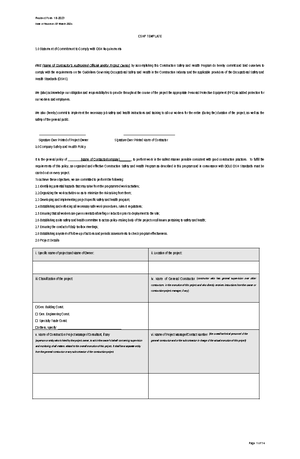- Information
- AI Chat
Was this document helpful?
Lesson 2 - Exercises - Politics, Governance and Citizenship
Course: Politics, Governance, and Citizenship (GEED 20023)
93 Documents
Students shared 93 documents in this course
University: Polytechnic University of the Philippines
Was this document helpful?

1. Enumerate and discuss briefly the essential elements of the state.
People - it is a community of persons living within a territory. The persons are
called the citizens. It does not matter how many persons there are as long as
they can be governed and have sustainable living.
Territory - is a measured fixed geographic property that covers fluvial, terrestrial,
and aerial domains. It can be large or small as long as the scope of state
sovereignty is maintained.
Government - it is the national administration by which the state's sovereign
power is exercised. It is regulated by the constitution to prevent abuse of power
over the people.
Sovereignty - it is the supreme power of the state over its people and territory. It
has two kinds: internal and external. Internal sovereignty is the power to rule the
citizens, and external sovereignty is the power to control external affairs like
jurisdiction for OFW. The external sovereignty is also called the independence of
the state. No state can exist without sovereignty.
Recognition - It can only be called a state when the people recognize its
government.
2. Distinguish state from nation and government
A state is a political concept that refers to a group of individuals who live
permanently on a definite territory. It should have government and be free from
external control, while a nation is an ethnic concept that a community living together
bounded by common traits and culture. There can be more than one nation in a
state. For example, the Philippines has only one Filipino state. But it has three-nation
the Luzon, Visayas, and Mindanao. On the other hand, the government is the
administration that has the authority to exercise the supreme power of the state.
Even if the government changes, the state remains the same as long as the
essential elements are maintained.
3. What are the inherent powers of the State? Discuss each.
Police Power
Police power - is the power of the state and the government to provide peace and
security for public welfare. It is the right of the citizens to have protection against
threats to their health and safety.
Power of Eminent Domain
The government has the authority to seize private property for public use, and fair
compensation is granted.
Power of Taxation
Students also viewed
Related documents
- Dela Torre, Michaella A.- BSBA HRM 2-4N Activity #1 Question #4
- Dela Torre, Michaella A.- BSBA HRM 2-4N Activity #1 Question #2
- Dela Torre, Michaella A.- BSBA HRM 2-4N Activity #1 Question #5
- Poligov - Develop and formulate your proposition as you watch the uploaded video
- Poligov Assignment 3 - Do you think China's actions in the South China Sea is amenable or agreeable with its neighbors
- Lesson 5 - Exercices - Politics, Governance and Citizenship









